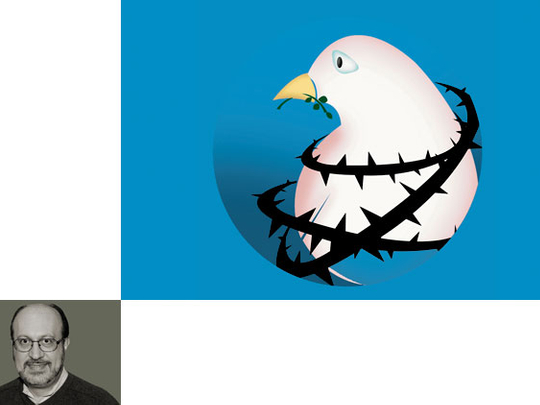
Twenty-one years after then General of the Army, now Member of Parliament, Michel Aoun was humiliated by the Syrian Army, Lebanon — still the single freest Arab country — suffers the consequences of his monumental errors. While today's tragic anniversary lingers in Lebanese hearts, genuine patriots remember as the mighty air force of brotherly Syria unleashed its bombs on the Ba'abdah presidential palace, which tamed the former rebel and secured his full submission.
If Aoun was anti-Syrian on October 13, 1990, his muddy positions since 2005 illustrated why he could not become president of the republic and, even worse, why his current preferences will literally usher in a new confrontation. Ironically, and despite internal accommodations that united Aoun with Hezbollah in 2006, his most recent opposition to the Special Tribunal for Lebanon, which was empowered to identify who murdered a former prime minister, threatened domestic stability. Baffled pronouncements of the newly-appointed and therefore hugely inexperienced Patriarch of the Maronite Church, along with baseless accusations that Washington and its European allies financed the "armed resistance" in Syria, guaranteed that the Arab uprisings would eventually spill over into Lebanon.
Aoun's political disorientation no longer requires sophisticated analysis. One can simply rely on what his closest lieutenants and allies confide to reach a devastating conclusion.
According to a WikiLeaks cable published last week, Free Patriotic Movement MP Ebrahim Kanaan told former US Ambassador to Lebanon Jeffrey Feltman on December 6, 2006, that Aoun was "the last person in Lebanon who want[ed] to see Hezbollah's militia keep its arms." Kanaan apparently pressed that while he fully "understood US scepticism over the FPM's relationship with Hezbollah", he nevertheless declared that Washington ought "to remember where Aoun came from — as former commander of the Lebanese Armed Forces [LAF] — and that he [Aoun] more than anyone want[ed] to see the LAF regain its constitutional primacy as the nation's sole protector and guarantor of sovereignty."
An equally devastating WikiLeaks cable, this one reporting on a November 6, 2007, meeting between Ambassador Feltman and the Speaker of Parliament, Nabih Berri, described Aoun as a "eunuch" among presidential candidates. While "the speaker beseeched [the ambassador] not to share his comment [on Aoun]," he nevertheless requested the American to investigate how to persuade the general from renouncing his presidential aspirations.
Berri raised several options with Feltman, including Aoun to concede the presidency in exchange for a bunch of ministerial portfolios, for the Speaker to align with candidates like Boutros Harb or Robert Ghanem, both of whom were close to Sa'ad Hariri and the March 14 coalition. Remarkably, Berri committed the Amal Party to side with Harb, only if Aoun agreed to step aside. In the event, LAF Commander Michel Sulaiman was elected on May 25, 2008, following an unprecedented crisis that was solved after Qatar gathered various participants in Doha to generously compensate everyone for their services.
Aoun could not accede to the presidency, but the damage he inflicted on the institution took on permanent features. Quick to claim injury, Aoun frequently plays the victim, asserting that he, and he alone, is transparent, just, impeccable and beyond reproach. Everyone else is a bully, eager to pounce on the hapless and destitute representative, whose only goal in life is to set an exemplary model, eliminate corruption, defend citizens and, above all else, to restore the powers of the Maronite community after those were allegedly emasculated by the 1989 Ta'if Accords.
Aoun neglects to remember that Amin Gemayel — one of his archenemies today — appointed him Prime Minister when parliament failed to elect a successor. Indeed, many Lebanese, both Christian and Muslim, rejected the militarisation of the presidency when Aoun fought tooth and nail to promote his "prime ministership." He opposed Syria's choice for President (Elias Hrawi), denigrated Hafez Al Assad, swore that he would mount a resistance against Damascus, and escaped an assassination attempt in 1990 at the hands of a Shiite assailant (as then reported by the New York Times), only to crawl to the French Embassy where he applied for, and received, political asylum.
Paris welcomed him for 15 years and Aoun lived in France as a relatively free man when most of his soldiers were dead and several of his opponents lingered in jail. Ironically, and at the height of the 2005 Cedars Revolution, the Lebanese Parliament absolved him of various accusations, including alleged money-laundering operations.
Just as Hezbollah fought the Israeli occupation of Southern Lebanon after 1982, and secured a withdrawal in 2000, it was March 14 forces that opposed Syrian occupation and ensured a Syrian pullout on April 26, 2005. Although Aoun may have forgotten this, it may be worth recalling that he returned to Lebanon on May 7, 2005, or 11 days after the withdrawal of Syrian troops.
Yet, unlike Hezbollah, which fought against occupation and can display democratic features at will, Aoun neglected to defend the country and seldom espoused transparency.
He pretends to speak for Beirut, even challenges the country's international commitments, though his own allies raise doubts about him. Above all else, he denigrates democracy, and stifles liberty at a time when Lebanon needs both more than ever. Lest the Lebanese forget, only freedom can, and will, preserve democracy in the Levant.
Dr. Joseph A. Kechichian is a commentator and author of several books on Gulf affairs.









